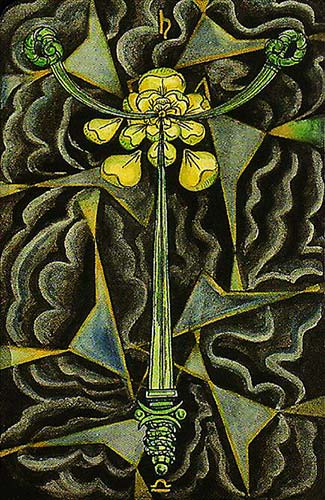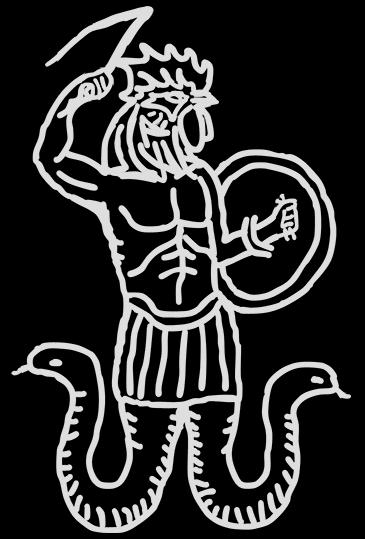
The Three of Swords represents heartbreak, sorrow, and the sharp clarity that comes with confronting painful truths. This card is one of the most poignant in the deck, marking moments of emotional difficulty that cannot be avoided. It speaks to the wounds inflicted by loss, betrayal, or separation and the need to process those emotions to move forward.
In the Thoth deck, this card bears the name ‘Sorrow’, which captures its essence but also its lesson. Pain, while inevitable, is not purposeless. The Three of Swords teaches that through grief, we gain deeper understanding and wisdom. This is a card of emotional reckoning, calling you to confront feelings you may have been suppressing and to acknowledge the truths that cut to the core.
The imagery often depicts three swords piercing a heart, surrounded by rain or stormy skies. The heart symbolises the seat of emotion, while the swords represent the intellect and the power of truth. The stormy backdrop reflects the turbulence of this moment, yet it also suggests that storms eventually pass, leaving clarity and growth in their wake.
On Heartbreak and Emotional Pain
The Three of Swords signifies times of emotional turmoil, where the weight of loss or betrayal feels overwhelming. It may point to the end of a relationship, a conflict with someone close, or even self-inflicted pain from unfulfilled expectations or regrets. While the experience is raw and difficult, this card encourages you to face the pain rather than avoid it. Only by acknowledging it can healing begin.
It’s also important to recognise that the Three of Swords is not solely about sadness—it’s about clarity. This card often brings hard truths to light, truths that may be painful but ultimately necessary for growth and change. It reminds you that heartbreak is part of the human experience and that it is through these challenges that you gain resilience and perspective.
Regarding Relationships
The Three of Swords can indicate unresolved tension, communication breakdowns, or painful truths coming to the surface. It may point to betrayal, a breakup, or a realisation that a connection no longer serves your highest good. While this can be painful, the card urges you to focus on honesty and self-respect.
For some, this card may reflect lingering wounds from past relationships. It asks you to examine whether these unresolved emotions are affecting your current connections and, if so, to work towards releasing them. Healing begins when you allow yourself to grieve fully, without judgement or suppression.
On Communication and Mental Conflict
As a card of the Swords suit, the Three of Swords also highlights the role of the mind in emotional pain. Harsh words, misunderstandings, or sharp judgements may have played a role in the sorrow depicted here. It is a reminder that while truth is important, it must be wielded with care. Words have the power to heal or harm, and this card invites you to reflect on how your communication affects others—and yourself.
Mentally, the Three of Swords can indicate inner conflict. Are you holding onto self-criticism or negative thought patterns that perpetuate your pain? This card encourages you to challenge those beliefs and begin the process of self-forgiveness.
On the Spiritual Path
The Three of Swords represents the deep wisdom that comes through sorrow. It is through heartbreak that we often gain the most profound insights into ourselves and the world around us. This card invites you to sit with your pain, not as a victim but as a seeker of truth. What lessons are hidden within the hurt? How can this experience guide your growth?
The name ‘Sorrow’ reminds us that pain is not the end but a passage. It can purify, sharpen, and clarify, much like a storm clears the air. The Three of Swords asks you to trust the process and recognise that even the sharpest wounds have the potential to heal.

Questions to Consider
- What pain or heartbreak are you facing, and how can you begin to process it?
- Are there hard truths or unresolved emotions that need to be addressed for healing to occur?
- How can you use this experience to gain clarity, wisdom, or strength for the future?
Exercise Idea
- Write a letter to the source of your sorrow—whether it’s a person, a situation, or even yourself. Pour out all your emotions without holding back. When you’re finished, choose whether to keep the letter as a reminder of your healing journey or destroy it as a symbolic release of the pain.
- Alternatively, try a storm meditation. Sit quietly and visualise a storm around you, representing your current emotional state. See the wind and rain carrying away your sorrow, leaving behind clarity and calm as the skies begin to clear. Trust that this process, like all storms, will pass.
